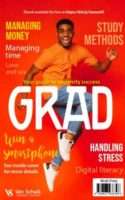BEFORE EXAMS
Check the venue and time the day before the exam.
Get up early and be at the venue with time to spare.
Do not talk to panicky students around you.
Go to the toilet before the exam starts.
When you get your paper, read all the questions and see how many marks each one represents.
Make a rough outline of how much time to spend on each question. You don’t want to spend half your time on something that can only earn you 10 marks out of a hundred.
Start with what you know best. You do not have to answer the questions in order. Leave the things you are unsure of for last.
Give yourself a moment to compose your thoughts before you start writing your answer.
Be clear and concise.
Try and keep your handwriting legible.
Ask the invigilator (the person who supervises the exam) for help if you are not clear on a question. He or she will tell you if you are asking something they are not allowed to say.
Don’t waste time worrying if you should ask, just do it.
Keep an eye on the time. Don’t spend more time on a particular question/section than it’s worth, or you may run out of time and lose all the marks allocated to the later questions.
Use every minute of the available time. If you finish early, review your answers before handing in the paper.
LEARNING FROM TEST AND EXAM RESULTS
The test or exam is over, you may not have achieved the mark you hoped for. It’s done now, so stop fretting. Rather use your marks as valuable information to do better next time:
Here’s a guide for that exercise:
If you did not complete the paper – Allocate your time in proportion to the marks each question is worth.
If you misread the question – Breathe deeply, stay calm and focus. Read each question twice before starting to write.
If you did not understand something in the question, perhaps a word or a scenario – ask the invigilator next time you are unsure.
If you did not come up with the right information – spend more time studying that section and make sure you know/understand it really well.
If you did not practise the method/procedure – practise the method/procedure on your own, do so. If not, go and see your teacher/tutor. A study group can also help.
If you do not understand the work covered by the question – study more, and/or go and see your teacher/lecturer. A study group can also help.
You still think you answered correctly, but you did not get the marks. Assess your answer honestly. Did you express your thoughts clearly? Was your handwriting clear? Did you really get to the heart of the question? If the answer to all the above is yes, go and see your teacher/lecturer. Find out why you lost the marks.


